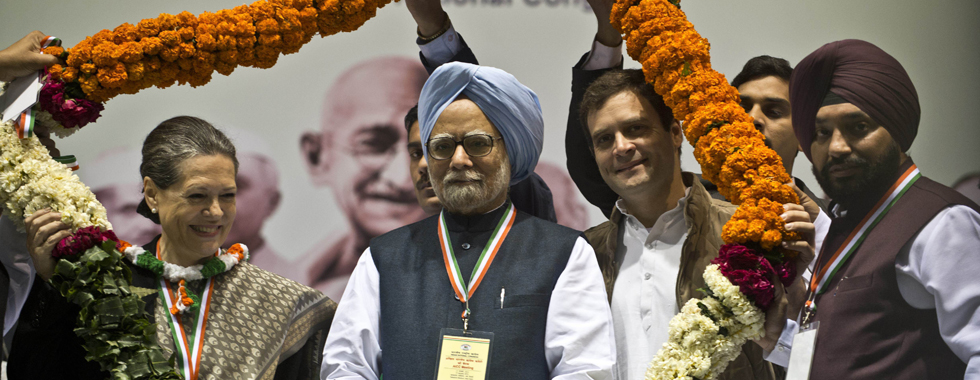Sunday Times 2
India’s decade of decay under Singh
NEW DELHI – Indian Prime Minister Manmohan Singh, who has been in office since 2004, recently held what was only the second media conference of his current five-year term, which is rapidly approaching an inglorious end. Betraying his yearning for approval, Singh told the assembled journalists that he hoped that history would judge his tenure more kindly than his political adversaries do.
That outcome seems unlikely, at best. On the contrary, Singh’s once-great Congress Party is now at a political impasse, from which it can escape only if it frees itself from its destructive dynastic leadership. After more than a half-century in government — much of India’s modern life as an independent country — the era of Congress dominance appears to be over.

Congress Party President Sonia Gandhi, Indian Prime Minister Manmohan Singh and Congress Vice President Rahul Gandhi pose inside a garland during a party meeting in New Delhi. AFP
Perhaps the clearest indication of the party’s decline occurred in December, when it suffered crushing defeats in four key state-assembly elections. In Rajasthan, Congress won only 21 seats, while India’s second-largest political force, the Bharatiya Janata Party (BJP), won 162. This represents a massive shift from the 2008 election, when Congress gained 96 seats, compared to the BJP’s 78.
Likewise, in Delhi, Congress was reduced to just eight of 70 seats after 15 years in power, with even Sheila Dikshit, Delhi’s longest-serving Chief Minister, losing her seat to a political newcomer. Only in the small northeastern state of Mizoram did Congress retain its majority. This was an unprecedented rout — and does not bode well for Congress in the upcoming national elections. To see why — and to determine whether the party can stem its own decay — requires understanding what has happened since Congress regained national leadership from the BJP-led National Democratic Alliance in 2004.
As the largest party, Congress became the hub of the newly established United Progressive Alliance (UPA). But, in a surprise move, the party’s leader, Sonia Gandhi, declined to become Prime Minister, naming Singh — an academic and civil servant, with no electoral experience — as the UPA’s choice. After nearly 40 days of melodrama, Singh was finally sworn in, though he had not won voter support directly in any constituency.
This unnatural arrangement instantly earned acid comments. As one observer astutely remarked, “Where there is authority, there is no ability; but where there is some ability, there is no authority.” Despite Singh’s academic abilities, his potential as India’s top politician was severely limited. Over time, it became apparent that Singh’s Government was worse than ineffective; it was doomed to fail, because Singh’s strengths lie in serving as an obedient and capable subordinate, not as an agenda-setting leader who acts decisively.
Consider his role in managing India’s economic transformation when he was the country’s finance minister in the early 1990s — an effort that his supporters have often cited as an example of his vision and ability. Last year, former External Affairs Minister Natwar Singh disclosed that it was actually then-Prime Minister Narasimha Rao, a shrewd and experienced Congress veteran, who pushed India’s economic reform and restructuring. Singh, reluctant to do what was needed, would have achieved very little had Rao not provided a platform — and the needed political support — to pursue the Government’s agenda. Early on, there were intimations that Singh should neither be underestimated as a political manipulator, nor overestimated as an effective economic manager.
But Singh’s ineptitude as a leader was already apparent before the revelation of Rao’s role. Not only has economic reform come to a virtual standstill since he took office, but he has also acquiesced to all of Gandhi’s demands, legitimate or otherwise.
As a result, governance, and thus the economy, has been deteriorating. India has been taken hostage by an extra-constitutional body composed of NGOs, brought together under the National Advisory Council, which is chaired by Gandhi. With the cabinet having become superfluous, the NAC’s decrees – including half-baked ideas inspired by the European welfare state — became policy.
As a result, Singh has presided over a sharp economic slowdown and soaring prices, especially for food. Meanwhile, political scandals, financial scams, and other criminal activities have proliferated under Congress rule since 2004. The UPA regime has effectively looted the country, and rampant corruption and a lack of accountability have decimated its leading party’s credibility. Through all of this, the supposedly economically literate Singh was little more than a silent spectator, offering only denials of responsibility or trite remarks from the perspective of a political outsider. And, while the damage that he has caused to Congress is for the party to solve, the damage that his aloofness has caused to the institution of Prime Minister is a problem for all Indians.
Manmohan Singh’s decade of disastrous leadership has been characterised by weakness and decay. India will suffer the consequences for years to come. Far from vindicating him, historians will know exactly whom to blame.
(Jaswant Singh, a former Indian finance minister, foreign minister, and defence minister, is the author of Jinnah: India – Partition – Independence and India at Risk: Mistakes, Misconceptions and Misadventures of Security Policy.)
Copyright: Project Syndicate, 2014.
www.project-syndicate.org
Exclusive to the Sunday Times

